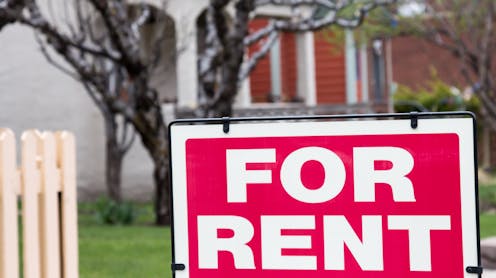Half of Australian landlords sell their investments after 2 years, adding to renters’ insecurity
- Written by Ranjodh B. Singh, Senior Economics and Finance Lecturer, Curtin University

Australia’s renters have to battle rising rents and a lack of available properties. They also face ongoing instability. Our new research suggests half of all landlords sell their investment properties after only two years, adding to renters’ insecurity.
Our study[1] released by the Australian Housing and Urban Research Institute, models the behaviour of landlords using longitudinal data from 2001 to 2021. It looks at what motivates small-scale investors to buy, sell or keep their rental properties.
This work can inform future planning for the private rental sector, which has been projected to continue expanding[2]. Both Labor and the Coalition were strongly criticised[3] for making little mention of renters or supply in their housing policies released on Sunday.
The short-term owners
Those landlords who got rid of their investment after two years, sometimes sooner, often did so because they hadn’t counted on the additional costs of property ownership or their circumstances changed because they divorced or lost their job.
While younger people aged 25–34 years were more likely to buy a rental property compared to other age groups, this group was also more likely to sell their property sooner.
Landlords who sold after two years or less, were more likely to be women, unemployed, unmarried and with low-to-moderate incomes.
How this makes renting less secure
Landlords who sell after a relatively short investment period disrupt the supply of private rental housing, which can potentially have a negative impact on both tenant security and affordability.
This includes unplanned moves for renters after a notice period, as well as possible increases in the amount of rent they have to pay. This type of exposure to precarious housing conditions adversely affects the wellbeing of tenants.
This is especially important given that the share of private renters in Australia has risen over the last 20 years and there is ongoing concern about affordability among private renters. Private renters[4] now represent about 30% of the market.
What motivates landlords?
Understanding the factors that increase the likelihood of landlords holding onto a property will contribute to tenure security in the rental sector.
These landlords tend to have higher educational qualifications, higher incomes and smaller mortgages on their own homes. As such, these landlords are financially stable and are able to withstand the higher economic costs of holding a rental property.
Our findings show there is value in establishing programs that offer education on property investment. This could support landlords’ efforts to hold their rental properties. It could also increase the supply of long-term rental housing for tenants.
As well, there should be more rigorous financial risk assessments by lenders and appropriate regulations so those who buy rental investment properties can afford to hold them.
Potential impact of policy changes
Policy changes that affect the costs of supplying rental housing for landlords could also have affordability consequences for renters.
Landlords will only continue to invest in the rental market if market conditions offer them income relative to their property values.
For instance, policy changes that apply long-term freezes to rent increases will reduce rental yields for landlords. This might in turn hurt the supply of rental properties available to renters.
Changes to policies affecting landlords’ tax positions could also have major impacts on whether they keep their rental investment over time.
For instance, if changes are made to capital gains tax[6] and interest rates that directly increase the landlord’s cost of holding an investment property, they will likely pass these costs on to tenants.
As a consequence, rents would become less affordable. Any changes to tax settings that affect landlords need to be rolled out incrementally. This will avoid destabilising rental markets and reducing the supply of housing available for tenants.
Why we need a secure rental market
Increasing the supply of private rental dwellings would help make renting more affordable.
Individuals who can afford investment properties add to the supply of private rental stock. And if they can hold their rentals for long periods, the rental market becomes even more secure.
Those who can’t hold their rental investments for long can disrupt the supply of private rental housing, with potentially negative impacts on affordability and security.
Our study has focused on individual landlords, which make up the majority of suppliers of rental housing in Australia. However, improving tenure security for renters will require more than just encouraging a stable flow of rental housing from individual landlords.
For instance, increasing institutional investment[7] in rental stock might result in more diverse and affordable housing options for renters.
Social housing is also a crucial source of secure housing for those who cannot compete in the private rental market. There is now an urgent need to redress decades of under-investment in social housing[8] in Australia.
References
- ^ study (www.ahuri.edu.au)
- ^ expanding (www.ahuri.edu.au)
- ^ strongly criticised (www.abc.net.au)
- ^ Private renters (www.abs.gov.au)
- ^ Ralf Kleemann/Shutterstock (www.shutterstock.com)
- ^ capital gains tax (www.ato.gov.au)
- ^ increasing institutional investment (nhsac.gov.au)
- ^ decades of under-investment in social housing (theconversation.com)
Authors: Ranjodh B. Singh, Senior Economics and Finance Lecturer, Curtin University







